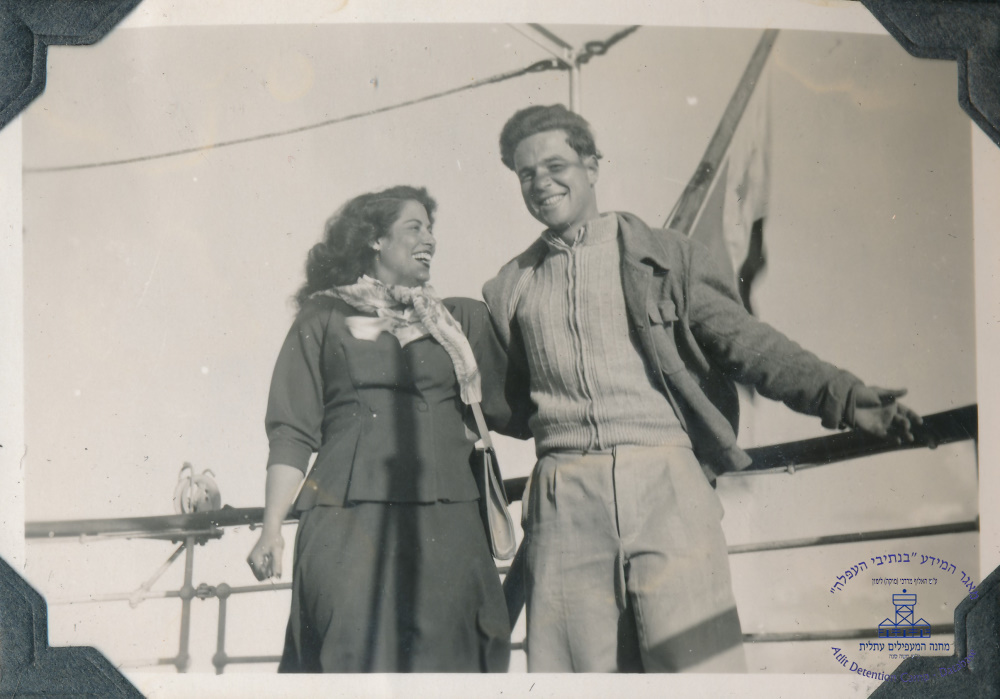Here's a true story: A little girl shyly makes her way to the front of a makeshift stage in a Cyprus detention camp and hands a bunch of weeds to the woman who has just performed a song. "Don’t be angry with me for giving you weeds,"
says the child. "We don’t have flowers in Cyprus. When I reach the land of Israel, I will give you flowers on behalf of all the children of the camp."
The year was 1948 -- just a few months before the proclamation of a state -- and a special delegation had been sent to Cyprus from Eretz Yisrael to gladden the hearts of Jews detained in the camps.
Among those in this cultural delegation was the young and talented singer of Yemenite origin, 25-year-old Shoshana Damari, and her accompanying pianist, who went on to become one of Israel's most famous songwriters and composers, Moshe Vilensky.
In the years leading up to independence, thousands of Jews who had fled the hellish shores of Europe tried to make their way to Mandate Palestine on ships. Many of these ships during the clandestine immigration years were captured by the ruling British, who were set on limiting the number of Jews allowed into Palestine. The clandestine immigrants (ma’apilim) were sent to detention camps in Cyprus and Mauritius, as well as to the Atlit Detention Camp just south of Haifa.
Instead of finally reaching the shores of the land they'd been yearning for after years of persecution and the horrors of the Holocaust, these Jews found themselves once more behind barbed wire, housed in barracks and guarded by armed soldiers in watch towers. They were still forbidden from being free in their own homeland, despite all that they’d been through.
The decision to send a cultural delegation to the camps in 1948 was met by the inmates with much excitement and enthusiasm. For weeks leading up to the visit, the inmates sang the songs the visiting delegation was expected to perform. They learned the words and the tunes, and their happy voices could be heard around the camps -- a marked difference from the depression, despondency, and boredom they'd felt since their capture.
Shoshana Damari already had a strong base of fans in the land to which she'd immigrated with her parents as a child. Her distinctive, husky voice and exotic looks made her stand out in any room, and she wasn’t shy in front of a crowd. But Damari describes her performances in the camps as one of the most humbling, emotional experiences of her long and illustrious career.
Nobody could imagine the incredible impact Damari and Vilensky would have on the people who came to watch them. Both symbolized the reality of a Jewish homeland -- Jews who developed their own culture and sang about their own flowers in their own fields, free Jews who stood in front of crowds and performed in such a moving way.
Day after day, the duo packed in as many performances as they could in front of the entranced crowds. They sang in open thorn fields under open skies, with the sun baking down on them. They sang to little children who had lost their entire families in the death camps. They made their way into huts and sang for people too weak to get out of bed.
They sang Vilensky's famous song Kalaniot, about red anemones growing on the hills of Eretz Yisrael. They sang songs mostly in Hebrew, but also in Yiddish, which Damari, with her traditional, guttural Yemini-Arab-tinged "chs" and "rs," learned from scratch just to bring joy to these brave detainees.
When she sang the old Yiddish lullaby, Rozhinkes Mit Mandles (Raisins and Almonds), the audience was always left in a flood of tears, remembering their lost childhoods and families. Damari remembers that many times, she was too choked up herself to complete the song because of the strong reaction it had on her audience.
“It was one of the most emotional things I’ve ever witnessed,” recalls a former detainee, Shalom Eitan.
“The entire camp gathered on the football field, where an impromptu stage had been erected in the middle," Eitan remembers. "On the stage stood a beautiful, bronzed woman, with a head of impressive black hair. But more beautiful than the way she looked was her voice. Those songs! She managed to electrify us all with her clear, unforgettable voice throughout the evening."
The delegation returned home over Pesach after a full week of performances. A few months later, after David Ben Gurion declared the birth of the Jewish state, Israel opened its doors to hundreds of thousands of immigrants, among them the detainees in Cyprus. Those incarcerated in Atlit were also freed.
Damari eventually went on to become one of Israel's most celebrated and beloved singers whose songs are still famous many years after her death. However, her performances in Cyprus, standing in the middle of fields and being handed weeds by a child, were probably the most important and rewarding of her career.
This heartwarming story and many others like it can be found in the Atlit Archives, where the Society for the Preservation of Israel Heritage has recorded, documented, and preserved tens of thousands of stories and testimonials for generations to come.
SPIHS, JNF, and other partners are currently working on a new and exciting master plan for the Atlit site, which will turn it into a first-class, primary tourist destination to attract visitors from Israel and abroad. Plans are underway to improve the property and exhibits, build a new entrance pavilion, and restore historic buildings.
To donate to this wonderful campaign, please click here: https://www.jnf.org/menu-2/our-work/heritage-site-preservation


